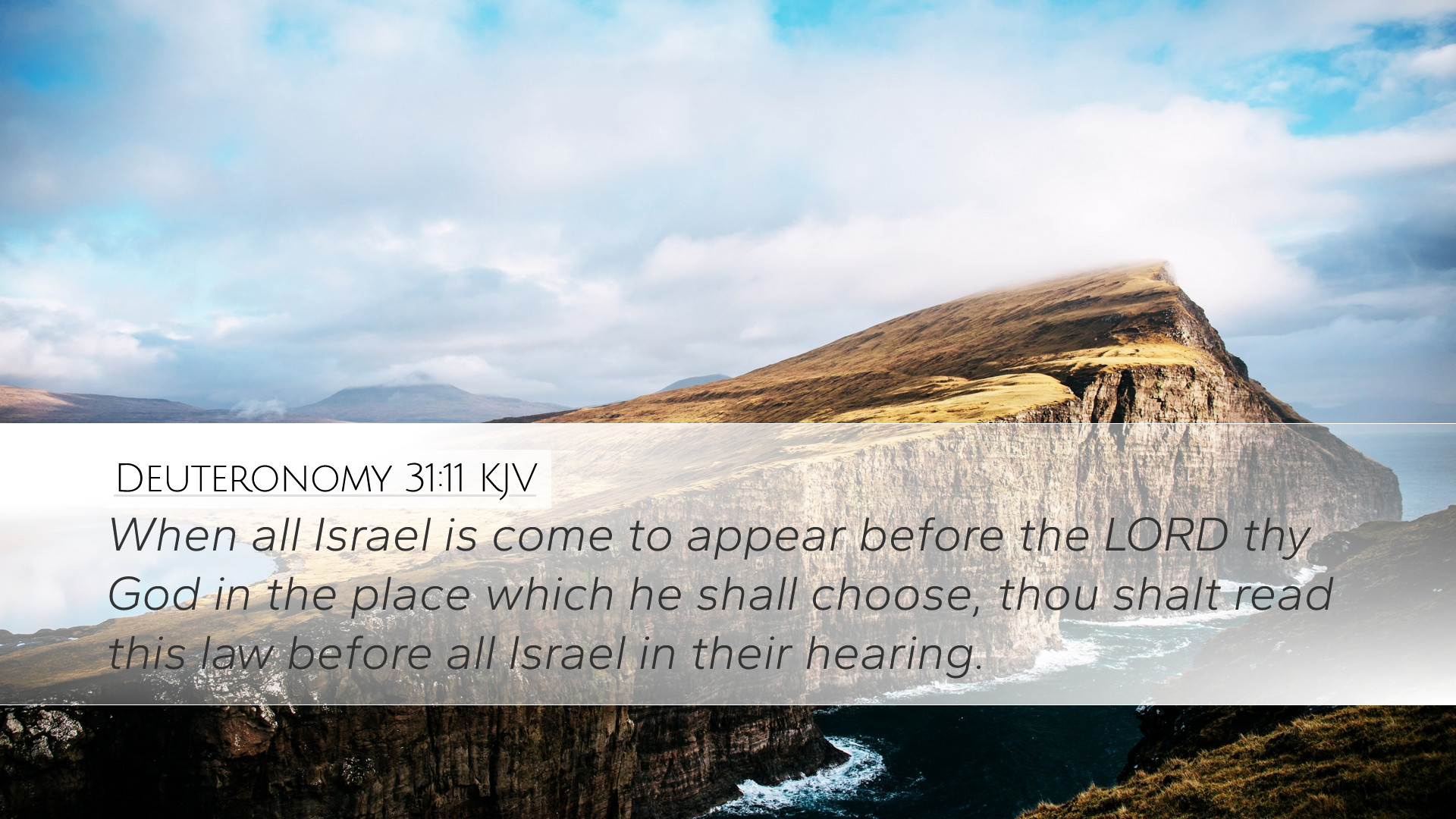Commentary on Deuteronomy 31:11
Verse Text: "When all Israel come to appear before the LORD thy God in the place which he shall choose, thou shalt read this law before all Israel in their hearing."
Introduction
The verse stands as a pivotal command regarding the public reading of the Law of God, emphasizing the importance of communal worship and the acknowledgment of God's covenant. This moment in Deuteronomy highlights both the duty of spiritual leaders and the collective responsibility of the Israelite community.
General Context
The book of Deuteronomy serves as Moses' final exhortation to the children of Israel as they prepare to enter the Promised Land. It is structured to reiterate the laws that govern their lives and their relationship with God. Deuteronomy 31 marks a transition where Moses prepares to commission Joshua and encourages the people regarding their future.
Commentary Insights
Moses' Instruction
Moses is commanded to publicly read the Law before all Israel. This is significant for several reasons:
- Preservation of God's Word: Public readings were essential for ensuring that the Law was well known among the people. As Matthew Henry notes, it functioned as a means to keep the commandments vibrant in the community's consciousness.
- Accountability: By hearing the Law read aloud, the Israelites would be reminded of their covenant obligations. Albert Barnes comments on the obligation this created for the people to adhere to God's statutes, thereby making them accountable to each other.
- Unity in Worship: This gathering highlights the necessity of unity among God’s people as they stand together to hear and respond to His words. Adam Clarke points out that the communal aspect strengthens their covenant relationship with God.
The Role of Leadership
Moses, as the leader, being commanded to read the Law, underscores the responsibility of spiritual leaders to teach and guide the community. The act of reading is not just a formality but a deeply spiritual practice aimed at reinforcing their identity as God’s chosen people.
- Instrument of Teaching: Leaders must engage in teaching their congregations the ways of God, ensuring that they understand both the blessings and the consequences of obedience versus disobedience.
- Model of Obedience: Moses himself exemplifies obedience in this directive. Leaders should embody the qualities they promote, reflecting integrity and dedication to God’s commands.
Relevance of the Law
This passage not only emphasizes the importance of the Law but also showcases its relevance in the life of the Israelites. The reading of the Law was essential for spiritual vitality and ethical living among the community.
- Guidance for Living: The Law served as a moral compass, instructing the Israelites in how to live in a way that is pleasing to God. This reflects a broader theological principle that God’s word provides direction in the believer’s life.
- Collective Memory: The act of remembering God’s deeds and commandments fosters a strong collective identity, reaffirming their understanding of God’s character and faithfulness.
Theological Implications
Deuteronomy 31:11 has profound theological implications that extend beyond the historical moment to encompass principles for worship and community in the contemporary church.
- Authority of Scripture: The imperative to read the Law reflects the authority of God’s word in guiding the community’s faith and practice.
- Communal Responsibility: Just as the Israelites were called to gather and hear the Law, modern congregations are summoned to collective worship where Scripture is central in shaping their lives.
- Covenant Reminders: The reading signifies a reminder of the covenant relationship they entered with God, encouraging ongoing faithfulness and dedication to His will.
Practical Applications
For pastors and ministers, this passage serves as a challenge to prioritize the reading and teaching of God’s word within their congregations.
- Encourage Regular Teaching: Incorporate regular readings from Scripture into worship services as a reminder of the foundation of faith.
- Facilitate Community Engagement: Create opportunities for the community to engage with the text together, enhancing collective understanding and accountability.
- Emphasize Lifelong Learning: Just as Israel was to continually engage with the Law, pastors can encourage members to delve deeper into God’s word through study groups and discipleship programs.
Conclusion
Deuteronomy 31:11 encompasses essential teachings about leadership, community, and the centrality of God’s law in the life of His people. The call to read and engage with God’s word publicly reinforces the means by which believers are both reminded of their covenant and encouraged to live in accordance with His will.


